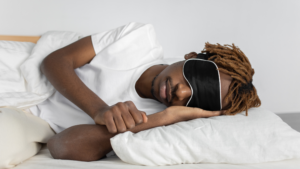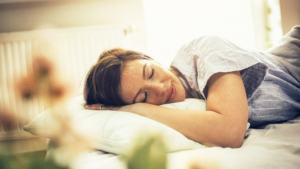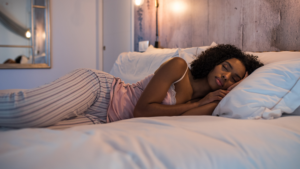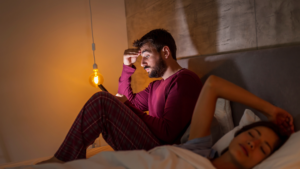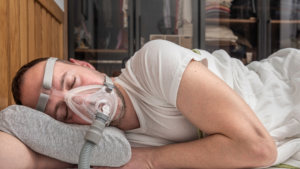In past articles we have covered how cannabis affects the sleep cycle, often being helpful for those to improve their sleep hygiene, and overall health when it comes to the importance of getting a good night’s sleep. But, what happens when you sleep high? Does cannabis affect your ability to have a deep sleep? Can cannabis, or even cannabis withdrawal, cause sleep problems?
Here we do a deep dive on what happens when you sleep high, while also looking into some of the research on cannabis as a sleep aid, and how cannabis may help with sleep problems and sleep disorders.
Sleep: Foundation for Our Health
Experts recommend that adults get between seven and nine hours of sleep per night for proper sleep hygiene.
Sleep hygiene refers to the practices and habits that promote healthy and restful sleep. Those who regularly get less than six hours of sleep are at a higher risk for a number of health challenges including issues with their cognition.
Sleep is crucial for our health as it plays a vital role in various physiological processes, such as hormone regulation and immune function.
Additionally, adequate sleep supports healthy cognitive function, emotional well-being, and overall mental and physical performance.
Despite understanding the importance of sleep many adults have sleeping problems and do not get sufficient sleep due to stress, anxiety, difficulty with pain management, their environment, or simply just not finding enough time to dedicate to rest and recharging.
According to the Center for Disease Control and Prevention, 70% of adults report they obtain poor sleep at least one night a month, while 11% report bad sleep quality every night, and 25% report sleep problems at least 15 out of every 30 days.
Cannabis medicine is one avenue that people can explore when they have difficulty sleeping to improve sleep as well as the time spent sleeping.
The Endocannabinoid System and Sleep
Those who embrace cannabis medicine understand that it hinges on an understanding of the endocannabinoid system (ECS).
The endocannabinoid system (ECS) can be viewed as a lock and key system, providing the foundation for how cannabinoids interact with our mind and body.
The ECS acts as a regulator of all bodily systems, including, but not limited to those that regulate sleep, mood, appetite, memory, and reproduction, working to bring the body into balance or homeostasis.
Initial studies provide evidence that the endocannabinoid system is involved in the sleep-wake cycle as well as sleep homeostasis.
Sleep homeostasis is the process of ensuring our bodies get enough sleep by signaling when the body needs sleep (i.e. that feeling of feeling sleepy and wanting to fall asleep), and also helps extend sleep when someone is sleep deprived as a means to “catch up” on sleep.
Further research shows that the cannabinoid receptor CB1, is an important part of sleep regulation, and that activation of the CB1 receptor can bring about sleep in animal models. Activation of the CB1 receptor, along with other receptors is what happens when you consume cannabis.
Can cannabis help you feel sleepy?
The effects of cannabis on sleep can vary depending on the individual and the specific strain and dosage consumed.
Some cannabis products may have sedative properties that promote relaxation, leading to an easier time falling asleep, however, some advise that having THC in lower doses rather than high THC doses will provide more sedative effects that may make you want to fall asleep faster.
Many people who live with chronic pain, however, will say that THC is crucial in a sleep aid helping them find pain relief to be able to fall asleep.
What about CBD for sleep?
The jury is still out on how CBD works to help you fall asleep faster and stay asleep.
Animal studies have shown that CBD may have a slightly stimulating effect, while in one study, two-thirds of people reported that CBD helped them fall asleep and improve sleep quality, while the remainder said CBD provided worse sleep efficiency.
More research needs to be done on whether CBD plays a role in improving sleep.
Is CBN really a sedative cannabinoid?
In the past, we have talked about the cannabinoid CBN, or cannabinol, and whether it is actually a “sleepy cannabinoid” or can be used as a sleep aid. CBN is created when THC oxidizes and is said to have sedative effects.
It is still up for debate as to whether CBN is effective for sleep on its own. More accurately, it’s assumed that CBN’s sedative properties are experienced when it’s combined with THC and terpenes that have evaporated via The Entourage Effect. In other words, its the terpenes that are the sleep aid, not necessarily the CBN cannabinoid.
Is there a difference between indica and sativa strains for sleep?
We have talked before about the myth of sativa and indica strains holding energizing and sedative effects respectively. In short, the idea that sativa strains are uplifting and energizing while indica strains make you feel relaxed, sleepy, or “in da couch”.
Whether a cannabis strain will be more energizing or stimulating versus whether it will produce more sedative effects comes down to its terpenes.
What are some sedative terpenes?
Some sedative terpenes found in cannabis, are myrcene and linalool.
Myrcene, commonly found in hops and mangoes, is known for its relaxing and sedating effects. Linalool, present in lavender and chamomile, exhibits calming properties and is often used in aromatherapy for its soothing effects.
Consuming cannabis with these terpenes may bring a sedative feeling akin to some sleeping medications, yet it depends on the concentration and dosage of the terpene consumed.
On this note, because all plants in the plant kingdom and not just the cannabis plant contain terpenes, other natural sleep aids may enhance the effects of marijuana products containing sedative terpenes.
Herbalists within the medical community suggest using natural sleep aids like lavender, chamomile, and hops as a way to enhance the sedative effect of some strains.
Why do I feel like I’ve had poor sleep when I’ve consumed marijuana?
Some medical marijuana patients may wake up in the mornings after they have consumed high doses of cannabis feeling as though they have a “hangover”; not the same as an alcohol hangover, but slightly altered of off-balance after they sleep high.
One study had 13 men smoke cannabis products, yet they didn’t know whether they contained active THC or whether it was a placebo.
The next morning, only those who smoked regular marijuana showed altered feelings and time-related task performance, indicating a distinct ‘hangover’ effect, while the non user control group did not have any difference in these indicators.
There are also more studies looking into how cannabis has an effect on sleep architecture, which is the organization of sleep, including stages and cycles. It involves brain wave activity, eye movement, and physiological changes.
Does being high affect sleep quality?
When looking at what happens when you sleep high, some studies suggest that cannabis may affect the sleep cycle by reducing the time spent in the REM (rapid eye movement) stage, which is associated with dreaming and memory consolidation.
Some individuals report experiencing vivid dreams or disrupted sleep patterns when sleeping high on cannabis.
It is important to note that the effects can differ from person to person, and while REM sleep is an important part of sleep cycles, it may not be terrible that cannabis use may inhibit it in the case of people with Post Traumatic Stress Disorder (PTSD).
People with PTSD often experience increased REM sleep, characterized by intense and vivid dreaming, which may contribute to disturbances and emotional distress commonly observed in individuals with this condition.
If cannabis use lessens the time spent in REM sleep, the patient will have more time in a light sleep, and less time in the deep sleep stages where disturbance and distress may occur.
Is cannabis helpful for some sleep disorders?
When other forms of sleep medicine have not worked for people with sleep orders, they have turned to cannabis use as a means to achieve a better sleep. What happens when you sleep high when you live with a sleep disorder? We summarize below:
Cannabis for Insomnia
Some medical cannabis patients swear by cannabis as a means to treat insomnia.
Cannabis has shown potential in treating insomnia, although further research is needed to fully understand its effects. One study published in the journal Medicines in 2018 investigated the use of medical cannabis for sleep disorders, including insomnia.
The study involved 409 individuals with insomnia who used medical cannabis. The researchers found that the majority of participants reported improved sleep quality and reduced insomnia symptoms after cannabis use.
However, it’s important to note that individual responses to cannabis can vary, and the study did not specifically control for different strains or dosages of cannabis.
Again, while the concept that smoking weed can help with insomnia seems to have some merit, more research and clinical trials involving different types of cannabis, terpene profiles, and conditions are needed to make a definitive statement.
Cannabis for Sleep Apnea
Sleep apnea is a sleep disorder characterized by recurrent interruptions in breathing, leading to frequent awakenings throughout the night.
This condition can cause various negative effects such as daytime sleepiness, fatigue, headaches, mood disturbances, and increased risk of accidents.
Preclinical studies have suggested that cannabis may offer benefits for sleep apnea. For example, a 2013 study found that a synthetic cannabinoid called dronabinol showed improvements in the majority of participants after 21 days of treatment.
Another study in 2002 indicated that THC, the active compound in cannabis, could restore respiratory stability by affecting serotonin signaling.
However, more clinical studies are needed to establish the efficacy of cannabis as a treatment for sleep apnea. Nonetheless, initial research provides promising insights into its potential therapeutic effects.
Can stopping marijuana use affect your ability to have a deep sleep?
We’ve talked about having a tolerance break in the past, most specifically for daily users. Those who take a tolerance break may find that they are having difficulty with sleep, especially if they have engaged in long term cannabis use and are used to going to sleep high.
According to a sleep study conducted in 2008, individuals who abstained from cannabis after long term cannabis use had shorter sleep duration, reduced deep sleep, lower sleep efficiency, longer time to fall asleep, shorter REM sleep cycles, and increased disturbances within sleep compared to a control group without cannabis use.
It’s important to note that this study was unable to determine causation, as it was not possible to tell if sleep problems were due to cannabis withdrawal.
So, is cannabis good or bad for sleep?
We have covered A LOT of topics here having to do with cannabis and how it affects our sleep. We’ve demonstrated how important sleep is to maintaining overall health and well-being.
We covered how different cannabinoids like THC, CBD, or CBN may affect sleep, while reminding our patients of the very important fact that if a cannabis product or strain is energizing or sedating comes down to its terpene profile.
We discussed how some people feel that they have a cannabis “hangover” which has some evidence to support that being a real thing. We talked about REM sleep and how cannabis affects or may treat sleep disorders like insomnia and sleep apnea.
We also talked about how taking a tolerance break can create sleep problems for daily marijuana users that non daily users may not experience.
So, the short answer to whether cannabis is good or bad for sleep is: it depends.
Since everybody is different and every BODY is different, cannabis, and different cannabis strains and methods of consuming cannabis will affect everyone differently.
Discover Whether Medical Marijuana is Right for You and Your Sleep
At Compassionate Clinics of America, we are very encouraged by the emerging research that shows how cannabis may help people with their sleep cycle, sleep disturbances, or just have a better quality sleep, but we are also aware that there are some factors and instances where cannabis may affect someone having a good night’s long sleep.
We encourage those who get a medical cannabis certification with us to try a few different products, keeping in mind that some cannabinoids and terpenes may have more sleepy or sedative properties than others.
If are a resident of Arizona, Arkansas, California, Connecticut, Delaware, Georgia, Illinois, Iowa, Louisiana, Maine, Maryland, Massachusetts, Michigan, Minnesota, Missouri, Montana, Nevada, New Jersey, New York, Ohio, Oklahoma, Pennsylvania, Texas, Utah, Vermont, Virginia, & West Virginia, and you’re concerned about a lack of sleep, poor sleep quality, or sleep disturbances, reach out to Compassionate Clinics of America to talk to one of our qualified medical practitioners about whether cannabis medicine may be helpful on your journey to better sleep and health.

